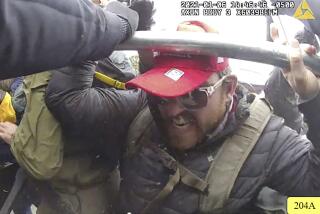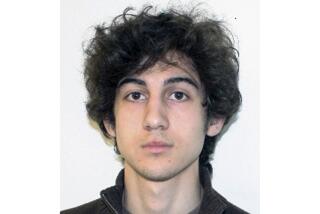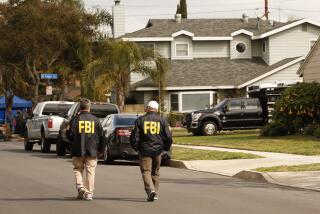Dzhokhar Tsarnaev disposed of Boston bombing evidence, memo says
WASHINGTON — Dzhokhar Tsarnaev, charged with carrying out the April bombings at the Boston Marathon, disposed of key evidence after the attack by “discarding a remaining bomb detonator and smashing his cellphones,” according to an internal memo approved by Atty. Gen. Eric H. Holder Jr. and made public Wednesday.
The memo, written to the director of the U.S. Bureau of Prisons to justify the imposition of harsh detention restrictions on Tsarnaev, also said he and his brother, Tamerlan Tsarnaev, “made additional bombs” after the lethal blasts and convinced others to “attempt to destroy evidence related to the attack.”
Dzhokhar Tsarnaev also told FBI agents upon his arrest that he remained “committed to jihad and expressed hope that his actions would inspire others to engage in violent jihad,” the memo said.
The memo, dated Aug. 27, was disclosed in court documents by Tsarnaev’s lawyers, who are asking a federal judge to ease the detention conditions that they described as close to solitary confinement.
Tsarnaev, 20, has pleaded not guilty to numerous charges, including using a weapon of mass destruction, and faces a potential death sentence if convicted. The two bombings near the finish line of the marathon killed three people and injured more than 260 others.
Holder said in the memo that the Tsarnaev brothers were directly “inspired” to detonate the two bombs during the marathon by radicalized American citizen Anwar Awlaki, who was killed in a U.S. drone strike in Yemen in September 2011, and that they “used bomb-making instructions from ‘Inspire,’ an Al Qaeda publication” printed in English.
The attorney general said Dzhokhar “employed operational tradecraft” to carry out the conspiracy and “purchased a dedicated cellphone” to secretly communicate with his older brother about the bombings. Tamerlan Tsarnaev was killed in a shootout with police several days after the April 15 bombings.
The memo, titled “Limited Official Use,” was sent to Charles E. Samuels Jr., director of the federal Bureau of Prisons.
Tsarnaev is being held at a prison medical center in Ayer, Mass. Holder used his authority as the top federal law enforcement official to impose strict detention measures to prevent Tsarnaev, a Chechen immigrant, from communicating with anyone outside the prison before his trial in U.S. District Court in Boston.
Any communications, Holder said, could “result in death or serious bodily injury” to others, and noted that Tsarnaev identified himself to the FBI as a committed terrorist. “There is no indication that Tsarnaev’s intentions have changed since,” he said.
He added that Tsarnaev had received “nearly 1,000 pieces of unsolicited mail” in prison.
Tsarnaev’s attorneys, including Judy Clarke of San Diego and Miriam Conrad, the federal public defender in Boston, added the memo to a court motion they filed Wednesday asking a federal judge to lift the restrictions.
They called the restrictions “unlawful and unwarranted” and said there was “scant factual support” to suggest that he remained a threat while locked up.
The government, the defense said, has not shown any instance where Tsarnaev has “done or said anything since his arrest to commit violence, incite violence or engage in communications that pose a security threat.”
Yet, the defense said, Tsarnaev is being held in near solitary isolation. “He is confined to his cell except for legal visits and very limited access to a small outdoor enclosure, on weekdays, weather permitting,” they said. “The purported basis for these conditions lies in the crimes he is alleged to have committed prior to arrest, not any behavior during his confinement.”
They further described the restrictions as “effectively punitive” and said they violated Tsarnaev’s legal rights, especially since he has not been convicted. “The negative effects of isolation on detainees are well-documented,” the defense lawyers said. “Indeed, the United Nations identifies long-term solitary confinement as a form of torture.”
As to his prison mail, they said none of it “could be characterized as ‘jihadist’ in nature” and instead was almost entirely letters and cards from people believing he was innocent and urging him “to repent and convert to Christianity.”
More to Read
Start your day right
Sign up for Essential California for news, features and recommendations from the L.A. Times and beyond in your inbox six days a week.
You may occasionally receive promotional content from the Los Angeles Times.







